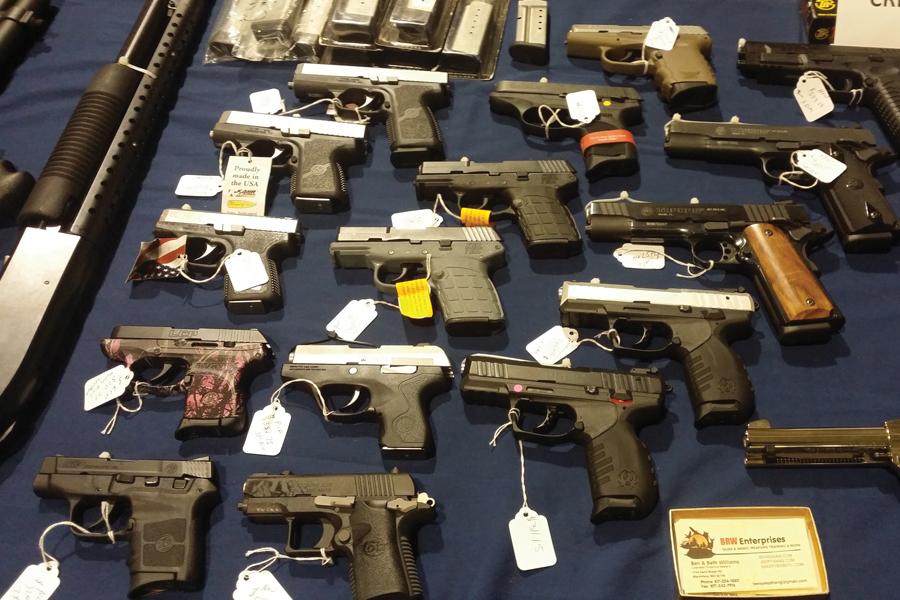OPINION: Protect our People – or our Guns? The High Price of Ignoring the Facts on Guns and Domestic Violence

It’s August 2, 2017. Ciera Jackson sighs in relief. She’s just been granted a restraining order against her ex-boyfriend, Victor Whittier.
Eleven days later, Jackson lies dead on her kitchen floor. Whittier, defying the restraining order, shot her four times through her kitchen window.
The path that led to Jackson’s death was littered with clear warning signs: Whittier sent her a string of threatening text messages, stalked her, broke into her apartment, and had a history of physically abusing her. But even with the restraining order in place, Jackson couldn’t escape the danger from Whittier that she and her 11-year-old brother feared. When investigators pressed Jackson’s little brother about possible suspects, he handed them the restraining order left in the kitchen where his sister died.
Ciera Jackson’s story is just one of thousands of similar stories that occur in the United States every year. Her vulnerability is the perfect example of what Democrats are trying to address by introducing legislation aimed at protecting victims of domestic abuse and gun violence. Two key issues are at play here. One is the “Boyfriend Loophole” that is currently being reviewed in Congress via the Violence Against Women Act (VAWA, H.R. 1585). The other is the NRA’s and GOP’s response to closing this loophole.
According to the Congressional Research Service (CRS) 2019 report, crimes against women more than doubled in the 1960s, going from 160.9 per 100,000 in 1960 to 328.7 per 100,000 by 1969. It wasn’t until 1994 that President Clinton signed the Violence Against Women Act into law which, according to the 2019 CRS report, has more than $8 billion in funding to investigate and prosecute crimes against women. Since its original signing, Congress has reauthorized VAWA four times, continuing to add provisions to protect victims of abuse.
On April 4, 2019, the Democrat-controlled House overwhelmingly approved a long-term reauthorization of VAWA. Legislators focused on several changes including improving data collection around domestic abuse cases (H.R.1585, Title XIV, Sec. 1409), changing how law enforcers assist victims (H.R.1585, Title II, Sec. 206), and the two most polarizing changes, expanding the definition of “intimate partner” and implementing stricter firearm regulations for those convicted of a misdemeanor crime of domestic violence (H.R.1585, Title VIII, Sec. 802). Herein lies the “Boyfriend Loophole.”
Historically, the law only prohibits those convicted of domestic abuse from purchasing firearms if they were married to, lived with, or had a child with the victim. This definition of “intimate partner” has allowed for what many Democrats term the “Boyfriend Loophole.” Ciera Jackson, murdered in her own home, is the perfect illustration of a victim of this loophole. Jackson’s story is an example of what sponsor Representative Karen Bass (D-CA-37) and her supporters want to protect against their proposed changes. In the current reauthorization of VAWA, legislators extend the definition of intimate partner to include stalkers and current or former boyfriends, as well as dating partners convicted of misdemeanors relating to domestic abuse (H.R.1585, Title VIII, Sec. 802). Had this definition been in place, Ciera Jackson might still be alive today.
It’s no surprise that the NRA’s ears immediately perk up at this new attempt to close the loophole. From their point of view, stricter laws around who can purchase firearms disrupt the sanctity of the Second Amendment.
NRA spokeswoman Jennifer Baker told National Public Radio that “the gun control lobby and anti-gun politicians are intentionally politicizing the Violence Against Women Act as a smokescreen to push their gun control agenda.” According to NPR, Republicans see this revision as a Democrat-pushing agenda whereby lawmakers can mask stricter gun law legislation behind the need to protect women. The NRA’s solution is not to increase firearm restrictions, rather, it’s quite the opposite – to promote increased ownership of firearms and to use them safely for self-defense. As Baker told Fortune, “The NRA opposes domestic violence and all violent crime and spends millions of dollars teaching countless Americans how not to be a victim and how to safely use firearms for self-defense.” Teaching someone how not to be a victim removes responsibility from offenders and puts it squarely on targeted victims. Not only is this self-evidently unfair, but it is also impossible. Even if Ciera Jackson had owned a firearm, her ex-boyfriend shot her, without warning, through her kitchen window. Owning a gun would have been of no use to her.
Representative Brian Fitzpatrick (R-PA) is the only GOP co-sponsor of VAWA’s 2019 reauthorization. A former FBI agent, Fitzpatrick worked closely with Rep. Karen Bass (D-CA) on the House version of the VAWA update. He told NPR that, for him, the correlation between domestic violence and those convicted of it owning a firearm is a no-brainer. “I understand for some of my colleagues that may be controversial. For me, it’s not … I think the biggest threat to the Second Amendment is when you allow all of these gun crimes to occur unaddressed because that erodes confidence and trust in people who are legitimately trying to protect themselves, their families, and their homes.”
According to the National Coalition Against Domestic Violence (NCADV), twenty Americans every minute are physically abused by an intimate partner, regardless of marital status. One woman in four experiences physical abuse by an intimate partner in her lifetime, and one in seven has been stalked to the point where she believes that she or someone close to her could be harmed or killed. Additionally, according to the National Organization for Women (NOW), 4.5 million American women report that a partner has threatened them with a gun. How does the presence of guns play into these numbers? According to NCADV, it increases the risk of homicide by 500 percent.
Diving deeper, Everytown For Gun Safety finds that, on average, fifty-two women a month are shot to death by a partner. The National Center for Victims of Crime reports that 76% of homicide victims murdered by an intimate partner were also stalked before their deaths; 67% of those had also been physically abused. Lastly, according to Giffords Law Center to Prevent Gun Violence, women are five times more likely to be killed if their abusers have guns, not to mention that domestic violence crimes involving a gun are twelve times more likely to end in death.
It isn’t just domestic abuse at issue here. The abuser’s right to own guns unfairly puts people who legitimately own firearms at risk of losing their Second Amendment rights. Representative Fitzpatrick’s stance sheds light on the polarizing nature of gun laws today and suggests that domestic violence involving guns makes it more challenging to defend American’s right to bear firearms. If gun violence is not addressed in scenarios like Ciera’s, inaction can create distrust in those who own firearms and discredit the legality of owning one for safety.
According to NPR, the NRA called for a “no” vote on the Boyfriend Loophole and notified Capitol Hill offices that the organization was scoring how legislators vote on the bill in order to measure ratings and endorsements in future elections. The majority of GOP lawmakers’ resistance to voting in favor of closing the Boyfriend Loophole demonstrates the political influence of the NRA.
Why must the conversation center on the right to bear firearms rather than on the crimes involving domestic abusers who are lethally armed? Wouldn’t prohibiting firearm purchase by those convicted of domestic crime, regardless of their relationship to the victim (H.R.1585, Title VIII, Sec. 802), help the NRA in its stated mission to support safe and responsible ownership of guns? This seems obvious, but what is equally obvious is that restriction of gun sales seriously impacts the NRA’s pocketbook and its ability to financially influence loyal GOP legislators. Neither the NRA nor their supporters want to imperil the cash flow from gun sales, even if it means more innocent victims get hurt.




